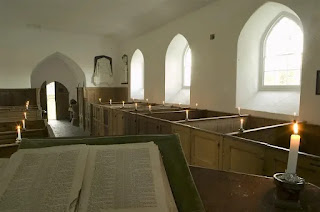Contours of Conformity, 1662-1832: Edward Welchman and predestination
The truth of this whole Article will sufficiently appear from the texts of Scripture, which I shall here subjoin. But I would desire the reader to observe, that only the grace of Election is asserted in it, and that the severity of Reprobation is left wholly untouched upon. And here I would advise him to stop, and to restrain his curiosity. For the doctrine of predestination is a profound abyss; in sounding of which it is but to little purpose for young men to busy themselves. Much less does it become preachers to trouble their auditors about these deep mysteries: they should rather set forth God's promises in general terms, as they are proposed in the Holy Scriptures, and as it is our duty to embrace them.
That Welchman acknowledges that Article XVII has nothing at all to say about a decree of Reprobation rejects the very first of the Lambeth Articles, championed by the Reformed tradition in the Jacobean and Caroline Church England: "God from eternity has predestined some men to life, and reprobated some to death". Welchman's commentary on Article XVII starkly contrasts with the earlier Reformed Conformist tradition, instead aligning with those who stood against the Lambeth Articles.
It was against the Lambeth Articles that Andrewes and Overall contended that Article XVII sufficed; that James VI/I stated "that such sort of Definitions did not tend to the Peace of the Church"; that Buckeridge, Howson, and Laud in their 1625 letter to Buckingham, praised the "moderation" of Article XVII, not "busy with every particular school-point", in order to "be able to preserve unity amongst Christians"; and that Charles I required that "all further curious search be laid aside, and these disputes shut up in God's promises, as they be generally set forth to us in the holy Scriptures, and the general meaning of the Articles of the Church of England according to them".
Welchman stands in continuity with these authorities against the earlier Reformed Conformist attempt to move beyond Article XVII and enshrine the Lambeth Articles.
There is also a very direct echo in Welchman of the 'Directions Concerning Preachers' issued by James VI/I in 1622:
That no preacher of what title soever under the degree of a bishop, or dean at the least, do from henceforth presume to preach in any popular auditory the deep points of predestination, election, reprobation or of the universality, efficacity, resistibility or irresistibility of God's grace; but leave those themes to be handled by learned men, and that moderately and modestly by way of use and application, rather than by way of positive doctrine, as being fitter for the schools and universities, than for simple auditories.
One of the key 'contours of Conformity' during the 'long 18th century' was the insistence that the debates in the Jacobean and Caroline Church regarding predestination had been a divisive, dangerous, and entirely unnecessary episode: there was, quite simply, no need to go beyond Article XVII. This was the position defended by a significant body of Jacobean and Caroline opinion, not to be marginalised with the descriptions 'avant garde' or 'Laudian'. Furthermore, it was, wisely, authoritatively stated that the mystery of predestination was an unsuitable subject for routine preaching. As Lancelot Andrewes had warned:
It would be to much better purpose to teach our People plainly the Way to Salvation in things manifestly relating to a holy and a well-govern’d Life, than to trouble their Heads with the Secrets of Providence, and the hidden things of God: whereas an over-curious Inquiry into these Things does but turn Peoples Heads, and make them break out into Enthusiastick Frensies, and scarce ever tend to the Edification of strait and narrow Dispositions.
In Welchmen's commentary on Article XVII, in other words, we see the significant discontinuity in the Reformed Conformist tradition. Post-1662 it was the wiser counsel of Andrewes and Overall, of Buckeridge, Howson, and Laud, which shaped Conformity; in which the mystery of predestination was understood not by means of the Lambeth Articles or Dort, but in the modest, moderate terms of Article XVII; requiring no reference to reprobation; and with the understanding that preachers "trouble their auditors about these deep mysteries". The fact that Welchman, standing in the Reformed school, gave voice to this understanding is important evidence of how the contours of Conformity were shaped and defined by a rejection of a key doctrinal ambition of the earlier Reformed Conformist tradition.




I appreciate the brevity of Article XVII and especially that it follows the contours of particular verses of Holy Scripture in the opening paragraph in setting out the doctrine of predestination and election. It doesn't necessarily take the interpretation as set out in the Lambeth Articles off the table but neither does it bind all all future consciences with the same. It would be short-sighted to do so in my opinion. If Holy Scripture is closely followed without excessive interpolation or extrapolation then it remains not only most catholic but also remains resilient to set the tone in future controversies. The Lambeth Articles might have been a suitable answer amongst the parties in question to maintain the bond of peace in its time and place, but certainly not everyone, everywhere and always walked and talked according to the terms of the Lambeth Articles. Imposing the Lambeth Articles on the CofE would have been an uncatholic move and made the earlier Reformation efforts ludicrous.
ReplyDeleteTim
Tim, yes, I agree with your key point: Article XVII does not require the interpretation set out in the Lambeth Articles but nor does it prohibit that interpretation. This is the wisdom of Article XVII, refusing to pry into the mystery of God's eternal decrees, not going beyond the general affirmations of holy Scripture.
Delete